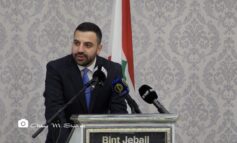SHANNON, Ireland (AFP) — U.S. Secretary of State Condoleezza Rice on Friday warned against diplomatic moves to solve Lebanon’s serious political crisis by compromising with the country’s pro-Syrian opposition. “I think there is a lot of talk right now about compromise,” she told journalists on a plane taking her to Ankara for talks with Turkish leaders on Kurdish rebels. “There are a lot of discussions going on. That is fine,” she added before a stopover in Ireland. “But any candidate for president or any president needs to be committed to Lebanon’s sovereignty and independence, needs to be committed to resolutions that Lebanon has signed on to … and needs to be committed to carrying on the tribunal.”
Rice was referring to the international U.N.-backed tribunal that was set up to prosecute those behind the murder of Rafiq Hariri, a five-time prime minister who was killed along with 22 others in a massive Beirut explosion in February 2005. She did not name names, but her statement appeared to be a veiled reference to a meeting between Michel Aoun, a pro-Syrian former president who is the opposition standard-bearer in November 12 presidential elections, and Hariri’s son Saad. Aoun met Wednesday and Thursday in Paris with Lebanese parliament leader Hariri, the leader of the pro-government bloc, for their first talks since Lebanon’s political crisis erupted in November last year. The French foreign ministry said it was not involved in the talks but stressed that France “supports all efforts aimed at encouraging dialogue between the different parties in Lebanon.”
Fears are running high in Beirut that the standoff between the pro- and anti-Syrian camps could lead to two rival governments, a grim reminder of the end of Lebanon’s 1975-1990 civil war when two administrations battled it out. Rice said she was going to discuss the issue with French Foreign Minister Bernard Kouchner in Turkey to send “the right message.”
It is “that the March 14 majority should not be put in a position of having to accept either extra-constitutional measures or measures that would undermine the program that they stand for.”
More than one million people protested Syria’s influence in Lebanese politics during a Beirut rally on March 14, 2005, a month after Rafiq Hariri’s assassination Meanwhile, the United Nations has released a report detailing the extent of the destruction caused by the oil spilled when the Israeli Air Force destroyed a slew of oil storage tanks and a key power station in Lebanon in July 2006. Human health, biodiversity, fisheries and tourism were all consequences. The destruction has had “serious implications” for livelihoods and economy in that continuously trouble-plagued country. The Israeli bombing, which destroyed storage tanks and the El-Jiyeh power plant, triggered the release of about 15,000 tons of fuel oil into the Mediterranean Sea, leading to the contamination of some 150 kms of coastline in Lebanon and neighboring Syria. The four weeks of bombings, characterized by an intense military conflict between Hizbullah and Israel, resulted in more than 1,183 fatalities, about one-third of them children, while 4,054 people were injured and 970,000 Lebanese displaced. After an assessment of the economic damage, the World Bank said the overall cost was between 527 million dollars and 931 million dollars, averaging about 729 million dollars, or about 3.6 percent of Lebanon’s gross domestic product in 2006. The damages affected forests, water, air, hotels, beach resorts, public beaches, restaurants and commercial fishing. The implications of the oil spill have been studied and assessed by over half a dozen international and environmental organizations, including the World Conservation Union (IUCN), the U.N. Development Program (UNDP), the U.N. Environment Program, the World Bank and the Food and Agriculture Organization. According to the IUCN, much of the shoreline ecosystem was physically and chemically contaminated. The oil spill had a direct impact on biodiversity hot spots and the fragile marine ecosystem, such as the only marine protected area in the country: Palm Islands Nature Reserve. In a report to the current session of the General Assembly, U.N. Secretary-General Ban Ki-moon urges the government of Israel “to take the necessary actions towards assuming responsibility for prompt and adequate compensation to the government of Lebanon.”
The international efforts to help Lebanon should be intensified, he says, in the study titled “Oil Slick on Lebanese Shores,” since “Lebanon is still engaged in oil removal, treatment of wastes and monitoring of recovery.”
“It should also be recognized that this oil spill is not covered by any of the international oil-spill compensation funds, and thus merits special consideration,” he notes. According to the 14-page report, financial and technical assistance have so far come from more than a dozen countries, including Kuwait, Norway, Cyprus, Denmark, Finland, France, Germany, Italy, Monaco, Spain, Sweden, Switzerland, Japan and the United States. But Israel is conspicuously absent from the list of donors. To date, the report says, the government of Israel has yet to assume its responsibility for prompt and adequate compensation to the government of Lebanon. The UNDP, which reviewed the many international and regional conventions that relate to oil pollution, found that all conventions are “inapplicable during armed hostilities.”
Additionally, the agreements that relate to spill compensation pertain only to oil spills from tanker vessels at sea, and not land-based incidents. The U.N. report also says that when the oil spill occurred in July 2006, “it overwhelmed national response capacity because of the ongoing conflict, the simultaneous need for a massive humanitarian response, the destruction of infrastructure and a land, air and sea blockade by Israel.”
These factors also impeded initial efforts for international assistance. In a report released last year, the London-based human rights organization Amnesty International said that during more than four weeks of ground and aerial bombardment by the Israeli armed forces, the country’s infrastructure suffered destruction on a “catastrophic scale.”
Israeli forces pounded buildings into the ground, reducing entire neighborhoods to rubble and turning villages into ghost towns, as their inhabitants fled the bombardments. Main roads, bridges and petrol stations were blown to bits, AI said. Entire families were killed in air strikes on their homes or in their vehicles while fleeing the aerial assaults on their villages. Scores lay buried beneath the rubble of their houses for weeks, as the Red Cross and other rescue workers were prevented from accessing the areas by continuing Israeli strikes, according to AI. “The Israeli Air Force launched more than 7,000 air attacks on about 7,000 targets in Lebanon between 12 July and 14 August 2006, while the Navy conducted an additional 2,500 bombardments,” AI added. On the humanitarian front, the United Nations and its relief agencies were outraged over the destruction of lives and infrastructure in Lebanon, in what then Secretary-General Kofi Annan called a “grossly disproportionate use of military force.”
The New York based Human Rights Watch (HRW) accused the Israelis of using artillery-fired cluster munitions in populated areas of Lebanon. “Cluster munitions are unacceptably inaccurate and unreliable weapons when used around civilians,” Kenneth Roth, executive director of HRW said. “They should never be used in populated areas.”
Jan Egeland, then U.N. Emergency Relief Coordinator, was quoted as saying “when one-third of the wounded and killed reportedly are children and women, then this goes far beyond responding to those armed groups (Hizbullah) and what they are doing against the civilian population in Israel.”





Leave a Reply